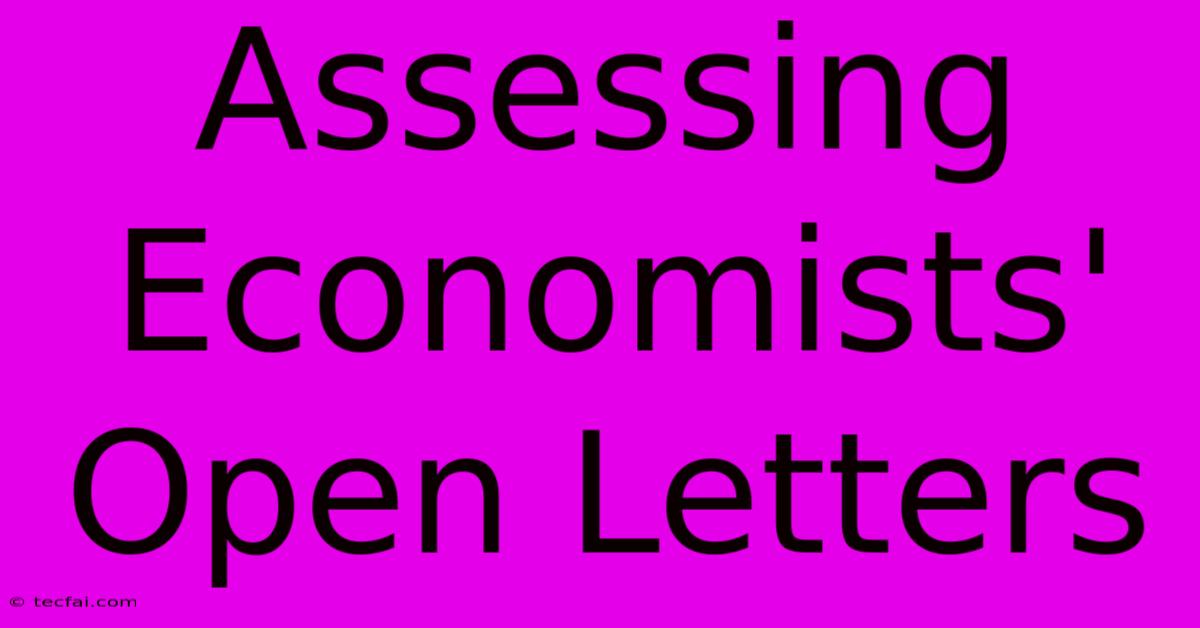Assessing Economists' Open Letters

Discover more detailed and exciting information on our website. Click the link below to start your adventure: Visit Best Website tecfai.com. Don't miss out!
Table of Contents
Assessing Economists' Open Letters: A Critical Examination of Influence and Impact
Economists, often seen as detached academics, occasionally break from their ivory towers to issue open letters addressing pressing economic issues. These letters, signed by dozens or even hundreds of prominent economists, aim to influence public policy and shape the economic debate. But how effective are they? This article critically assesses the impact and influence of economists' open letters, exploring their strengths, weaknesses, and the broader context in which they operate.
The Power of Collective Voice: Why Open Letters Matter
Open letters wield considerable influence due to the collective weight of their signatories. A single economist's opinion, however insightful, might be dismissed. However, a letter signed by numerous respected figures – especially Nobel laureates – commands attention from policymakers, media outlets, and the public. This collective voice amplifies the message and lends it greater credibility, particularly when the issue at hand is complex and contentious. The sheer number of signatures can be a powerful signal of consensus within the economics profession.
Analyzing the Effectiveness: Factors Influencing Impact
The effectiveness of an open letter is multifaceted and depends on several key factors:
- The Clarity and Precision of the Message: A well-written letter avoids jargon and clearly articulates the problem, proposed solutions, and their potential consequences. Ambiguity weakens the impact. Vague statements are easily dismissed.
- The Timing and Relevance: A letter released at a critical juncture, such as during a policy debate or economic crisis, is far more likely to resonate than one issued at an inopportune moment.
- The Credibility of the Signatories: The letter's impact is directly proportional to the reputation and perceived expertise of the signing economists. Letters signed by internationally recognized economists carry significantly more weight.
- Media Coverage and Public Engagement: Extensive media coverage significantly boosts the letter's reach and influence. The letter's engagement with the public through social media and other channels also plays a vital role.
- The Nature of the Issue: Some economic issues are more amenable to clear consensus and policy recommendations than others. Highly complex or politically charged issues may be less susceptible to influence by open letters.
Limitations and Criticisms: Beyond the Signed Names
While open letters possess undeniable influence, they are not without limitations:
- Potential for Bias: The selection of signatories can be biased, potentially excluding dissenting views and creating a false sense of consensus.
- Lack of Detailed Analysis: Open letters are, by their nature, concise. This brevity can prevent a full and nuanced exploration of the economic issue at hand, leading to oversimplification.
- Limited Accountability: Unlike academic papers, open letters are often not subjected to the same level of peer review and scrutiny.
- Difficulty in Measuring Impact: Assessing the precise impact of an open letter on policy decisions is challenging. It is difficult to isolate the letter's influence from other factors that contributed to a particular policy outcome.
Conclusion: Navigating the Nuances of Economic Influence
Economists' open letters serve as a vital channel for conveying expert opinion and influencing economic policy. However, their effectiveness is contingent on various factors, including message clarity, timing, signatory credibility, and media attention. A critical assessment reveals both their potential to shape economic discourse and their inherent limitations. While not a panacea for influencing policy, carefully crafted and strategically released open letters can play a significant role in shaping the economic debate and guiding policymakers towards informed decisions. Future research could focus on developing more robust methods for evaluating the real-world impact of these interventions.

Thank you for visiting our website wich cover about Assessing Economists' Open Letters. We hope the information provided has been useful to you. Feel free to contact us if you have any questions or need further assistance. See you next time and dont miss to bookmark.
Featured Posts
-
Serena Williams Second Child Doubts About Love
Dec 03, 2024
-
Fsi Announces New Commercial Officer
Dec 03, 2024
-
Horse Racing Tips Monday Ffos Las Plays
Dec 03, 2024
-
2025 Premier League Prices Rejection
Dec 03, 2024
-
Crampton And Nana Debate Spending Cuts
Dec 03, 2024
